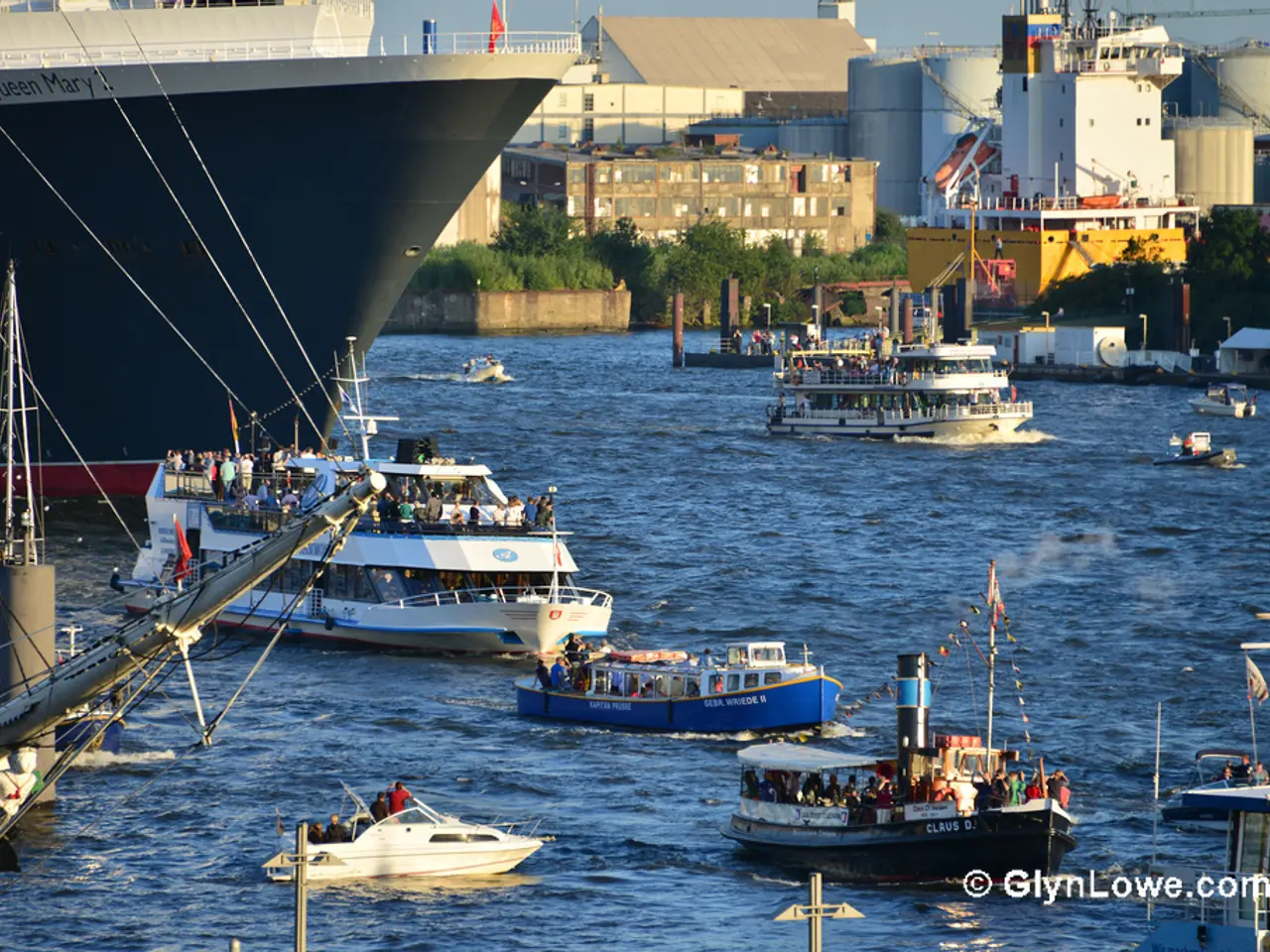Intense anticipation preceding the assembly of Seabed Authority, amidst prevailing pessimistic sentiments
The International Seabed Authority's 30th session is scheduled towards the end of this month, with daily meetings leading up to a full Assembly in Kingston, Jamaica from July 21st to 25th.
The draft agenda for the Assembly reveals that key discussions will include administrative matters, as well as item number 16: "The need for a general policy of the Authority for the protection and preservation of the marine environment: scope and parameters."
Given the current political climate, this session comes at a crucial and challenging time. The USA is threatening to allow its miners to proceed with seabed mining without a moratorium, despite the preference of many member states for a pause in mining activities.
We reached out to Dr. Claudio Bozzi, a specialist in Law of the Sea and Maritime Law, to help us understand the myriad complexities and far-reaching issues that the ISA members are grappling with.
Let's dive in.
Kickstarting the Code
The 30th session of the International Seabed Authority (ISA) commenced earlier this year with its new Secretary-General, Leticia Reis de Carvalho, reminding delegates of their mandate to "promulgate rules, regulations and procedures (RRPs) for the mining of the seabed and ocean floor beyond the limits of national jurisdiction (the Area)," as stipulated by the United Nations Convention on the Law of the Sea (UNCLOS).
Since 2014, the ISA has been under growing pressure to develop a mining code, dictated by UNCLOS to manage the Area in a manner that conserves the environment and recognizes seabed resources as "the common heritage of mankind."
Working groups were established in 2020 but didn't start working in earnest until 2022 due to the Covid-19 pandemic. In 2021, the Republic of Nauru triggered the 'two-year rule' by informing the ISA of its intention to apply for an exploitation license within two years, pushing the ISA to adopt RRPs within the same time frame or risk Nauru conducting activities without regulations in place.
The two-year rule has resulted in a paradoxical situation: it has hastened the ISA's efforts to formulate RRPs, yet it has also prompted member states and environmental organizations to call for a moratorium (Canada, Mexico, New Zealand, Peru, Switzerland, United Kingdom), a conditional (or precautionary) pause (Austria, Brazil, Costa Rica, Chile, Kingdom of Denmark, Dominican Republic, Ecuador, Federated States of Micronesia, Fiji, Finland, Germany, Greece, Guatemala, Honduras, Ireland, Malta, Monaco, Palau, Panama, Portugal, Spain, Samoa, Sweden, Tuvalu, Vanuatu), or an outright ban (France) on seabed mining.
Australia has not taken a firm stance on the issue, but at the 2023 ALP National Conference, the Labor Party unanimously passed a resolution stating that they will ensure the Australian Government "leads ambitious international efforts for global agreements on a moratorium on deep-sea mining in international waters."
The Deep Science Behind Seabed Mining
The primary rationale for a ban or pause on seabed mining is a lack of comprehensive scientific understanding of deep-sea ecosystems. The ISA still lacks an overarching environmental management framework and policy, having not developed RRPs, environmental goals, objectives, or principles or even proposed discussions on such matters.
At the March session, the Kingdom of Tonga proposed that the risk standard for environmental harm in the Area should be 'as low as reasonably practicable' (ALARP) to maintain flexibility for revisions as data becomes available. This fundamental issue, determining the risks of deep-sea mining, is divisive both among member states and between the ISA and the external scientific, environmental, and political communities.
The ISA is Under Pressure
During the first part of the 30th session, as delegates were meeting to draft RRPs, Secretary-General Leticia Reis de Carvalho announced that The Metals Company (TMC) had filed an application under US law to obtain a US Government license to mine in the Pacific Ocean off American Samoa. This 'unilateral action' by TMC was denounced by de Carvalho as defying the authority of the ISA, violating international law, and undermining the principles of multilateralism. TMC alleged that the ISA had repeatedly breached UNCLOS by failing to enact regulations and obstructing the transition from exploration to exploitation.
Some member states criticized TMC's actions as a violation of good faith obligations, while others reaffirmed that only the ISA has the authority to issue mining licenses under international law. TMC indicated that it intended to apply for an ISA mining license in June 2025, regardless of whether a Mining Code, including environmental safeguards, is finalized.
The Renewables' Revolution
It is often argued that a pause on seabed mining will obstruct important processes such as the transition to renewable energy, as these technologies depend on metals from seabed sources. However, economic considerations are thought to be more influential in deciding the viability of seabed mining than a moratorium.
US President Donald Trump signed the Executive Order: "Unleashing America's Offshore Critical Minerals and Resources" on the premise that it has the potential to add $300 billion to GDP while creating 100,000 jobs. China currently has the majority of registered seabed mining claims, while the US has none.
The Test of Seabed Mining
Contractors are able to undertake test mining operations prior to submitting a mining application under draft RRPs. A working group formed to advance the regulation of test mining experienced division among member states on several core issues.
Reference Zones
Before a contractor can exploit a seabed field, they must establish reference zones to gauge environmental impact on a 'before and after' basis and ensure mining is conducted within authorized limits. However, the Council has only discussed the position that reference zone regulations should occupy in the RRPs.
Regional Environment Management Plans
Most member states have supported the incorporation of Regional Environmental Management Plans (REMPs) into the RRPs. REMPs must be in place before mining can commence in any area. Only one REMP has thus far been adopted by the ISA - for the Clarion-Clipperton Zone in the northern Pacific Ocean.
The regulatory status of REMPs and the nature of their provisions is ambiguous due to inconsistent treatment. In one example, Germany objected that TMC's environmental management plan contained insufficient environmental data. The plan was revised, and Secretary-General Lodge informed TMC that it could proceed.
The obligatory nature of REMPs will need to be determined or the specific provisions that must be mandated will need to be identified. If REMPs are non-binding as a whole, it may be inconsistent for RRPs to require contractors to comply with them but not inconsistent to require contractors to follow certain provisions.
Payment Regime
The payment regime for the right to extract minerals from the seabed has been contentious. Two proposed models, a fixed low royalty based on the value of the extracted metal and a mechanism for offsetting any competitive advantage enjoyed by seabed mining versus land-based mining (the Equalisation Measure), have proven divisive between private contractors and member states of the ISA.
Compensation
The long-term consequences of seabed mining are poorly understood, including destruction of habitats, loss of species, depletion of resources, and alterations to the ecosystem. The principle of "the common heritage of mankind" encompasses long-term assessments and intergenerational responsibility. However, a lack of baseline data about the environment obstacles the development of standards, guidelines, and impact assessments.
The establishment of the fund required by UNCLOS to compensate developing countries for the harm suffered due to reduced mineral export values caused by the entry of seabed minerals into the market is likely to be a complex task fraught with debate.
Equitable Sharing
The draft RRPs necessitate the "equitable sharing of financial and other economic benefits" from the Area for the advantage of humanity, with particular attention to the interests and needs of developing states. Prioritizing equitable distribution requires accurate and detailed economic modeling to avoid distorted outcomes, like the concentration of funds in a small number of states or a universal distribution providing little to no financial benefit to each state.
Technology Transfer
The transfer of technologies and scientific knowledge from developed to developing countries is essential to the proper functioning of the seabed mining regime under Part XI of UNCLOS. Despite consistent emphasis on these principles in UNCLOS, the RRPs barely mention them, with sharing information and technical capacity made discretionary rather than obligatory.
Confidentiality
One of the primary concerns for the new Secretary-General is the transparency and accountability of the ISA, which can be achieved through institutional reform. Decision making in the ISA has been criticized for its obscurity. The ISA should make non-confidential information publicly available, but contractors have been allowed to decide the information they will share during the exploration process.
Public Participation
Given the public interest in deep-sea mining and its consequences, particularly since the Area is designated "the common heritage of mankind," there is a concerning absence of public consultation in decision-making processes.
While ISA members identified stakeholder engagement as a priority in 2019, the ISA still lacks a policy or strategy for consulting the public in decision making. Consultation should be expanded to include affected communities beyond just member states and observers.
Nothing is agreed until everything is agreed
If the 30th session is to yield tangible results, core issues must be resolved, and the regulations they necessitate finalized. The principal RRPs for discussion are those regarding the prerequisites for exploitation (environmental protection guidelines, Regional Environmental Management Plans) and the equitable sharing of financial and other economic benefits ('benefit sharing').
Given that a single Council member vote can block the adoption of a resolution, "nothing is agreed until everything is agreed." The number of outstanding and unresolved issues that parties have divergent views on or require more information to advance suggests reason for pessimism.
- The ISA's 30th session, scheduled towards the end of the month, is taking place amidst a political climate where the USA is threatening to allow its miners to proceed with seabed mining without a moratorium, despite member states' preferences for a pause.
- The session's agenda includes discussion on item number 16: "The need for a general policy of the Authority for the protection and preservation of the marine environment: scope and parameters," which highlights the lack of an overarching environmental management framework and policy at the ISA.
- In light of the pressing issues related to climate-change, environmental-science, policy-and-legislation, and politics, both the general-news media and crime-and-justice contexts might be interested in monitoring the ISA's decisions during this session and their impact on the marine environment.





